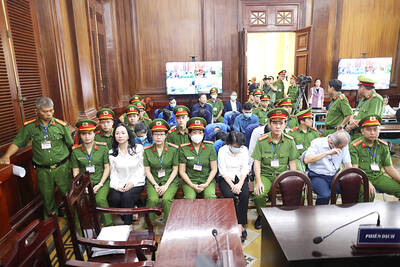Organized crime gangs dealing in fake goods, drugs, human trafficking and the illicit wildlife trade earn nearly US$90 billion annually in East Asia and the Pacific, a UN report showed yesterday.
Transnational Organized Crime in East Asia and the Pacific: A Threat Assessment is the most comprehensive study ever undertaken of the subject, the UN Office on Drugs and Crime (UNODC) said.
It estimates that the top money-makers for criminal groups are the trade in counterfeit goods (US$24.4 billion), illegal wood products (US$17 billion), heroin (US$16.3 billion) and methamphetamines (US$15 billion).
Fake medicines (US$5 billion), the black market trade in used electronics components to avoid legitimate recycling (US$3.75 billion) and the illegal wildlife trade (US$2.5 billion) also rank highly.
Migrant smuggling and the trafficking of women and girls for prostitution or general labor also earn crime bosses hundreds of millions of dollars each year.
UNODC deputy executive director Sandeep Chawla said the report opened the window on “the mechanics of illicit trade: the how, where, when, who and why of selected contraband markets affecting this region.”
“It looks at how criminal enterprises have developed alongside legitimate commerce and taken advantage of distribution and logistics chains,” he said at the launch in Sydney.
Chawla highlighted the growing problem of heroin. Consumption is rising across the region — estimated at 65 million tons in 2011 — with Chinese the main users and Myanmar the key producer.
“Myanmar is the principal source of opiates in Southeast Asia. Doing something about tackling opiates in Myanmar is a very important thing for the region,” Chawla said.
“Clearly that is something that more attention can be given to with the change in government that’s happening in the country at the moment,” he said.
Jeremy Douglas, the UNODC regional representative for Southeast Asia and the Pacific, said many of the organized criminal activities could have serious global health implications.
“Between one-third to 90 percent of anti-malarial drugs tested in Southeast Asia are fraudulent,” he said, with China and India the main culprits in production,” Douglas said.
“They do not contain what they say they do. Sub-standard drugs have two serious public health consequences: One: people get sicker or die; Two: drug-resistant strains can develop and cause a global health threat,” he said.
With rapid economic growth leading to a proliferation of criminal networks, he said the threat was now so great that it has the ability to “destabilize societies around the globe.”
“Illicit profits from crimes in East Asia and the Pacific can buy property and companies and corrupt anywhere,” Douglas said.
“We need to talk about this, and organize a coordinated response now. It takes a network to defeat a network,” he said.
The trade in counterfeit goods is the most lucrative activity, despite being considered a “soft” form of crime, with China the worst culprit.
According to the World Customs Organization, 75 percent of all fake products seized worldwide from 2008 to 2010 were from East Asia, primarily China, with the industry accounting for about 2 percent of world trade.
“The key players in counterfeit markets are brokers and logisticians who connect supply and demand,” the report said.

Republican US lawmakers on Friday criticized US President Joe Biden’s administration after sanctioned Chinese telecoms equipment giant Huawei unveiled a laptop this week powered by an Intel artificial intelligence (AI) chip. The US placed Huawei on a trade restriction list in 2019 for contravening Iran sanctions, part of a broader effort to hobble Beijing’s technological advances. Placement on the list means the company’s suppliers have to seek a special, difficult-to-obtain license before shipping to it. One such license, issued by then-US president Donald Trump’s administration, has allowed Intel to ship central processors to Huawei for use in laptops since 2020. China hardliners

A top Vietnamese property tycoon was on Thursday sentenced to death in one of the biggest corruption cases in history, with an estimated US$27 billion in damages. A panel of three hand-picked jurors and two judges rejected all defense arguments by Truong My Lan, chair of major developer Van Thinh Phat, who was found guilty of swindling cash from Saigon Commercial Bank (SCB) over a decade. “The defendant’s actions ... eroded people’s trust in the leadership of the [Communist] Party and state,” read the verdict at the trial in Ho Chi Minh City. After the five-week trial, 85 others were also sentenced on

Conjoined twins Lori and George Schappell, who pursued separate careers, interests and relationships during lives that defied medical expectations, died this month in Pennsylvania, funeral home officials said. They were 62. The twins, listed by Guinness World Records as the oldest living conjoined twins, died on April 7 at the Hospital of the University of Pennsylvania, obituaries posted by Leibensperger Funeral Homes of Hamburg said. The cause of death was not detailed. “When we were born, the doctors didn’t think we’d make 30, but we proved them wrong,” Lori said in an interview when they turned 50, the Philadelphia Inquirer reported. The

RAMPAGE: A Palestinian man was left dead after dozens of Israeli settlers searching for a missing 14-year-old boy stormed a village in the Israeli-occupied West Bank US President Joe Biden on Friday said he expected Iran to attack Israel “sooner, rather than later” and warned Tehran not to proceed. Asked by reporters about his message to Iran, Biden simply said: “Don’t,” underscoring Washington’s commitment to defend Israel. “We are devoted to the defense of Israel. We will support Israel. We will help defend Israel and Iran will not succeed,” he said. Biden said he would not divulge secure information, but said his expectation was that an attack could come “sooner, rather than later.” Israel braced on Friday for an attack by Iran or its proxies as warnings grew of